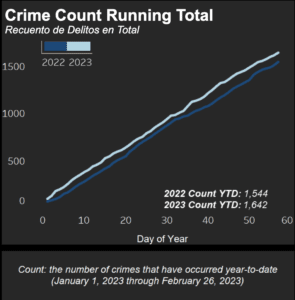Following an audit that revealed the Dallas Police Department (DPD) had thousands of uncategorized digital files, questions have been raised concerning the dependability of Dallas’ criminal justice system.
In November 2022, DPD finished an internal audit that found 52,000 uncategorized files, signaling potential violations of a law passed in 2021.
The legislation stipulates that law enforcement agencies must provide a written statement affirming that “all documents, items, and information in the possession of the agency that are required to be disclosed to the defendant … have been disclosed to the attorney representing the state.”
If any of the uncategorized data files were evidentiary in nature and not disclosed, then legal complications could follow.
Further, Dallas County District Attorney John Creuzot has criticized DPD for not letting him know of the issue immediately following the audit.
“Let me begin by saying I am continuing to engage in a constant dialogue with DPD Chief Eddie Garcia, and we agree this situation deserves our immediate attention,” Creuzot explained in a press release.
He continued, however, “The Dallas County Criminal District Attorney’s Office was not made aware of the 52,000 uncategorized digital files at the Dallas Police Department until media reports surfaced.”
“Of course, we would have liked to have been made aware and perhaps should have been made aware of this issue when it was initially discovered,” Creuzot added.
The DA did note that while “these materials are believed to be more of an administrative nature rather than investigative … due to the volume of uncategorized files, it is also possible that some contain investigative materials.”
“If so, DPD has been instructed to immediately send that information to my office,” Creuzot’s statement concluded. “We owe the community our best efforts to ensure that justice is served on every allegation of criminal conduct.”
However, the Dallas Police Department has explained that Creuzot was not made aware of the issue with the files because it was an ongoing internal matter.
DPD Public Information Officer Kristin Lowman told The Dallas Express, “Notifications were not made due to this being an internal audit and an administrative matter.”
She also clarified that, out of the uncategorized files, “Many are test video[s] checking equipment at the start of a shift, or a simple call for service where no action was taken.”
“Not all of the records are digital evidence,” Lowman added. “The files could be any number of calls we respond to that no arrest was made or no report was done. For example, an accident, an alarm call with no offense generated.”
“It’s important to note that while uncategorized [files] are more difficult to find on the system — they are not deleted from the system,” she asserted.
Currently, 99% of the 3.8 million DPD files are categorized, according to the department.
Nevertheless, worries persist regarding the effectiveness of the criminal justice system in Dallas.
Jacob Colglazier, the executive director for local activist group Keep Dallas Safe, suggested to The Dallas Express, “Dallas hardly has a criminal justice system. The good people of Dallas are victimized by criminals, and then victimized by the rogue prosecutors and judges that set them free.”
“DA Creuzot and others use terms like ‘racial justice’ to mask their true intention: creating ‘equality’ by making every corner of Dallas equally dangerous,” he added.
Violent crime has risen by 6.3% year-over-year in 2023, according to data retrieved from the DPD crime analytics dashboard on February 27.

Furthermore, Dallas has struggled to attract a sufficient number of police officers and department personnel, leaving 856 positions vacant, according to a recent report by The Dallas Express.


